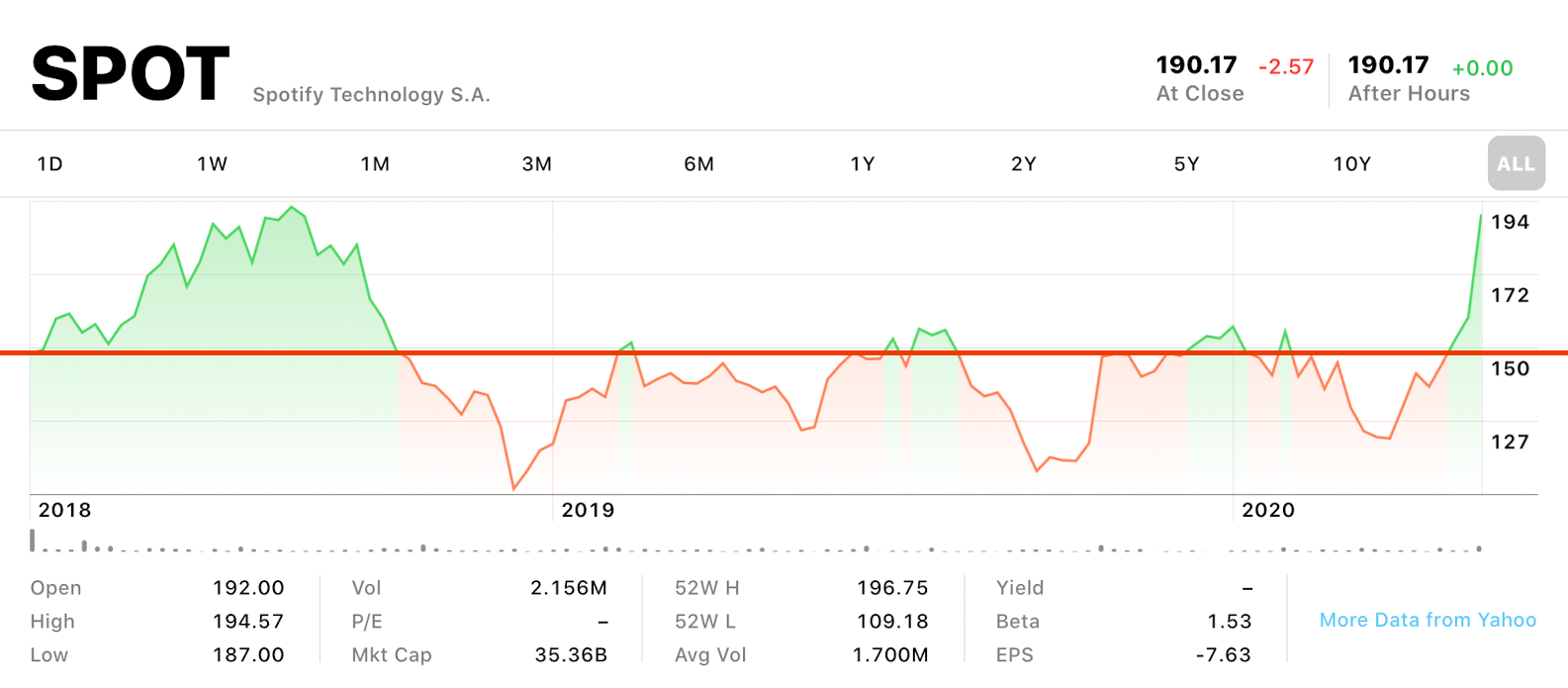Spotify vs Fitbit: Marty Cagan’s false premise and false cause fallacy
In response to my article Spotify’s Failed Squad Goals, product management consultant Marty Cagan gave us a teachable moment in the false cause fallacy. He pitted Spotify against Fitbit as a proxy for extremes in how “empowered” teams are. He attributed the companies’ stock performances to this difference. Two little problems: Fitbit and Spotify are not polar opposites and sometimes the market does not reward innovative “empowered product teams” equally.
Mr Cagan’s false premise
[Fitbit] adopted the polar opposite of the empowered team model. This process uses delivery teams rather than empowered product teams…
This is outright false. Mr Cagan assumed the absolute worst implementation of SAFe at Fitbit simply because its stock performance has been terrible. As Mr Cagan admitted in his response, he has no experience working as a product manager at either company. His outsider assumptions about team structure and empowerment at Fitbit and Spotify were incorrect.
Spotify-the-company (as opposed to Spotify-the-model1) and Fitbit actually had much in common.2 From Mr Cagan’s definition of empowered product teams, both companies had teams that were cross-functional (product, design, engineering). Both companies had teams empowered to figure out the best way to solve the problems they were asked to solve in ways customers love, yet work for the business.
Mr Cagan’s third requirement for an empowered product team, however, was best demonstrated by Fitbit. Teams at Fitbit were focused on and measured by outcomes rather than output. Fitbit correctly used OKRs to measure the effect of doing something, rather than the delivery of something. Spotify most often misused OKRs as a method for prioritizing and scoring delivery of work, rather than how delivered work affected key performance indicators.
The biggest differences between the organizations were that Fitbit had widespread comprehension of Agile practices, shared processes for collaborating, and people (program managers) to support these processes. Teams at Fitbit had slightly less autonomy because some processes and tools were prescribed, but they had a greater ability to innovate as a result of those support structures.
Mr Cagan’s false cause fallacy
First, did Spotify succeed because of the process they used? And did Fitbit suffer because of the process they used? There’s really no way to know for sure but the theory I argued in Empowered Product Teams and The Most Important Thing would explain both Spotify’s success as well as Fitbit’s struggles
In Mr Cagan’s argument, “empowered product teams” produce innovation and innovation is rewarded by the market. A company with a well performing stock must have collaboration processes that are effective and a company with a poor performing stock must not have collaboration processes that produce the innovation required to dominate the market. Besides being a false cause logical fallacy, it is a meritocracy argument that ignores reality. Businesses sometimes fail even with a great team and sometimes businesses succeed even with terrible collaboration and cultures.
Actual premise
Some people seem to think Mr Cagan smartly countered the points in my article. Not so. He smartly agreed with me.
[…] what about the specific criticisms of the Spotify model that were called out in the article? Are they fair criticisms? I think they are, and in fact in 2013 I raised those very same concerns to leaders at Spotify.
Unfortunately, Mr Cagan then fixated on 1 sentence at the end of my article:
The Scaled Agile Framework worked well for Fitbit when I worked there.
In hindsight, I wish I had not included this line because it distracted some people from the ~2,200 other words. I included it because I wanted to give people some direction of what to research next. I also included it because the entire time I worked at Spotify, I compared it to my experience working at Fitbit. I never thought of Fitbit as particularly fast or exceptionally well managed when working there, but the slow pace and less collaborative attitudes at Spotify made Fitbit seem outstanding by comparison.
Actual cause
A brief, incomplete list of actual reasons Spotify has succeeded:
- Its innovative content licensing, legal, and finance teams (not product! music streaming is a commodity)
- A shared investor with Facebook got Spotify early exclusive access to its platform to introduce most Americans to music streaming and other music services never caught up
- Its ability to partner with so many companies due to less conflict of interest simply by not being part of Amazon, Apple, or Google
A brief, incomplete list of actual reasons Fitbit has struggled:
- The transition from fitness trackers to smart watches happened faster than it anticipated
- Apple’s anticompetitive practice of not sharing iOS APIs it uses for Apple Watch with other smart watch makers
- Its biggest competitors (Apple, Samsung) have significant supply chain advantages, far more employees, and can tolerate more risk due to product portfolio diversity
A note on stock performance and definition of success

Spotify’s stock has traded below its IPO price for most of its time as a publicly traded company. The giant spike recently was not due to some empowered product team win, but from Spotify securing exclusive licensing to a popular podcast.
There is no denying Fitbit’s IPO was terribly mismanaged by a since-ousted CFO. But Fitbit’s stock price has little to do with how well it has been able to compete against industry giants Apple and Samsung. Google is in the process of acquiring Fitbit because Fitbit has succeeded in maintaining competitiveness with Apple and Samsung, something allegedly empowered product teams at Google were unable to do with Android Wear. Pending regulatory approval, Fitbit will be Google’s second largest acquisition ever.
- My clarification in response to original article ↩︎
- Fitbit and Spotify also shared two of the biggest organizational challenges I experienced working at them: immense tech debt from rapid growth and too much consensus seeking. ↩︎